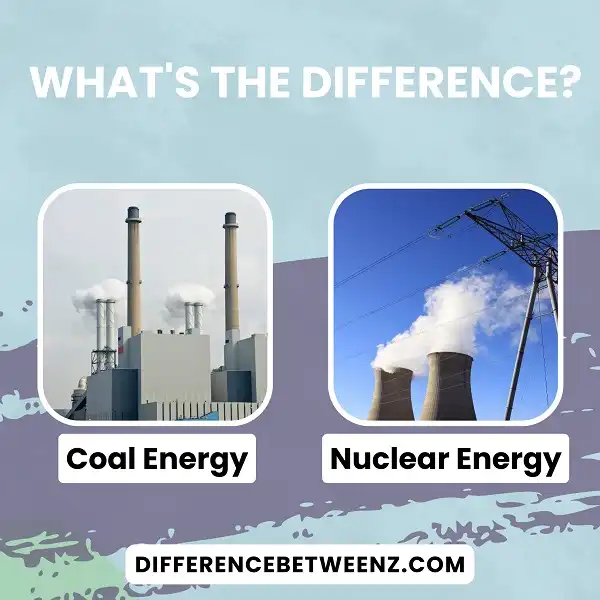Both nuclear and coal energy have been used for many years to generate electricity. However, there are some important differences between these two types of energy. Coal is a fossil fuel, while nuclear energy is produced through the use of uranium. Nuclear energy is also more expensive to produce than coal-based electricity. Additionally, nuclear reactors can be dangerous, while coal-fired plants release harmful emissions into the atmosphere.
What is Coal Energy?
Coal energy is the energy that is derived from coal. Coal is a black or brownish-black sedimentary rock that is naturally combustible. The three main things that coal is used for are to generate electricity, make steel, and produce cement.
- Coal is used to generate about 40 percent of the world’s electricity. It is burned in power plants to create steam which turns turbines that create electricity. Steel and cement are both made from heated coal.
- Coal gasification and liquefaction are also processes that are used to create coal energy. Coal gasification is the process of converting coal into a gas. This gas can then be used to create electricity or to make other chemicals and fuels.
- Coal liquefaction is the process of converting coal into liquid fuels such as gasoline, diesel, and jet fuel. Coal energy has many pros and cons. Some pros of coal energy are that it is inexpensive, it is abundant, and it has a variety of uses.
Some cons of coal energy are that it emits greenhouse gases when burned, mining can be dangerous, and burning coal can release toxins into the environment. Coal energy is a topic that has much debate surrounding it because of its pros and its cons. It is important to do research on coal energy before forming an opinion on it.
What is Nuclear Energy?
- Nuclear Energy is the energy that is released when the nuclei of atoms split apart. Nuclear reactions can be used to generate electricity, and they are also used in nuclear weapons.
- Nuclear energy is a very efficient way to produce electricity, but it also comes with a number of risks. One of the most significant dangers of nuclear power is the potential for accidents.
- Nuclear accidents can release radiation into the environment, which can cause health problems for people and animals. In addition, nuclear reactor waste is highly radioactive and must be carefully disposed of to prevent contamination. Despite these risks, nuclear energy remains a popular choice for generating electricity, as it emits no greenhouse gases and has a relatively small footprint.
Differences between Coal Energy and Nuclear Energy
Coal Energy Coal is a black or brown sedimentary rock that can be burned for fuel and used to generate electricity. It is made up of organic materials such as dead plants, and it is a non-renewable resource.
- Nuclear Energy Nuclear energy is the energy released by atoms during nuclear fission or nuclear fusion. It can be used to generate electricity, but it is also very dangerous and can be used to make weapons.
- Coal energy is less expensive than nuclear energy, but it is also more polluting. Nuclear energy is cleaner but is much more expensive. Coal energy is non-renewable, while nuclear energy is renewable.
- Coal energy is more carbon intensive than nuclear energy. In conclusion, coal and nuclear energies have different pros and cons, so it’s important to weigh those before deciding which one to use.
Conclusion
Coal and nuclear energy are two of the most commonly used sources of electricity in the world. Though they share some similarities, there are also several key differences between these two types of energy. Let’s take a closer look at coal energy and nuclear energy, starting with their history and how they work. We’ll then explore the benefits and drawbacks of each type of energy to help you decide which is right for your needs.


